Vietnam is a beautiful and diverse country that offers something for every traveler. Vietnam has everything from stunning natural landscapes to vibrant cities, rich history and culture, and fantastic cuisine.
However, before planning your trip to this fascinating country, it’s important to consider the best time to visit. Vietnam has a tropical climate with distinct wet and dry seasons, and the weather can vary greatly depending on the region and time of year.
Choosing the right time to visit can make a big difference in your travel experience, from avoiding crowds and high prices to enjoying the best weather and activities.
This article provides a comprehensive guide to the best time to travel to Vietnam, considering the different regions and travel interests.
Get ready to discover the perfect season for your Vietnam trip!
Contents
Dry Season (November to April)
Weather conditions during the dry season
The dry season, which lasts from November to April, is the ideal time to visit Vietnam if you’re considering a trip there.
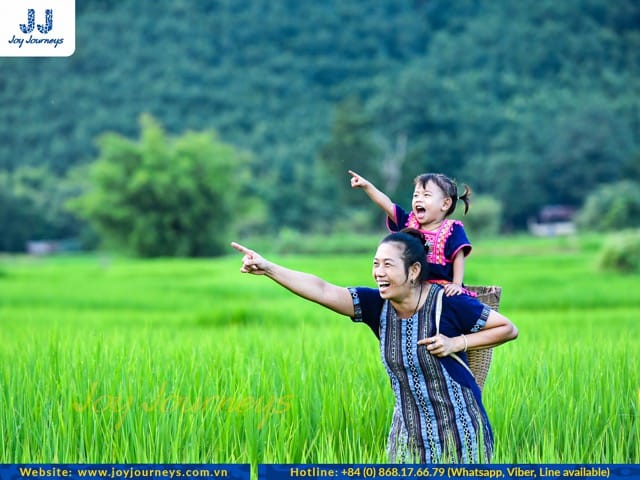
But what can you actually anticipate during the dry season? To begin with, there is often little to no rain and a warm, sunny climate.
This makes it the perfect time to engage in outdoor pursuits like hiking, cycling, and touring the country’s numerous national parks.
The dry season brings colder temperatures to the north of Vietnam, where they can fall as low as the 50s Fahrenheit (10–15 degrees Celsius) in December and January.
The various natural treasures of central Vietnam may be explored at their best when the weather is mild and dry.
The dry season in the south of Vietnam delivers hot, muggy weather with average highs of 90 degrees Fahrenheit (32 degrees Celsius).
Ideal activities for the dry season in each region
It’s the perfect time of year to visit Mu Cang Chai’s beautiful rice terraces and Sapa’s breathtaking scenery, thanks to the milder temperatures in the north of Vietnam.
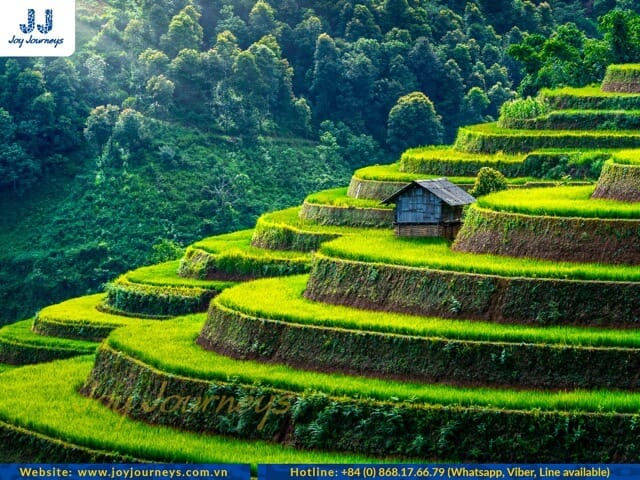
The north of Vietnam is home to many ethnic minority groups, including the Hmong and Dao communities.
During this season, visitors to Mu Cang Chai and Sapa can learn about these communities’ unique cultures and traditions by visiting local markets, attending festivals, and participating in homestays.
The Hmong and Dao groups are well-known for their vivid textiles, delicate needlework, and traditional handicrafts, which make excellent souvenirs.
You can also sample native cuisines, such as thang co, a Hmong soup made with horse meat, and Dao grilled pork sausages.
The dry season in central Vietnam is suitable for trekking through Bach Ma National Park’s lush jungles or the Marble Mountains.
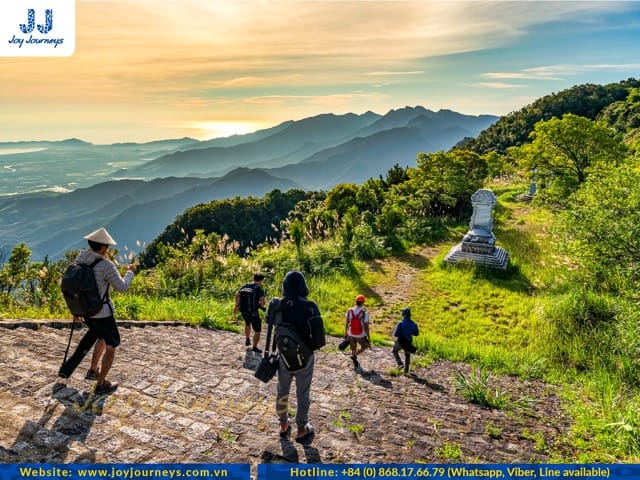
Vietnam features some of the most magnificent beaches in Southeast Asia, from the unspoiled beaches of Da Nang to the breathtaking coastline of Phu Quoc.
Therefore, the dry season is the best time to enjoy the sun and surf on Vietnam’s beautiful beaches, which will please beach lovers like me.
In the pristine waters, you can go swimming, surfing, or scuba diving in addition to sunbathing.
The dry season is also a perfect time to go kayaking or take a boat tour in Halong Bay or the Mekong Delta if you prefer water-based activities.
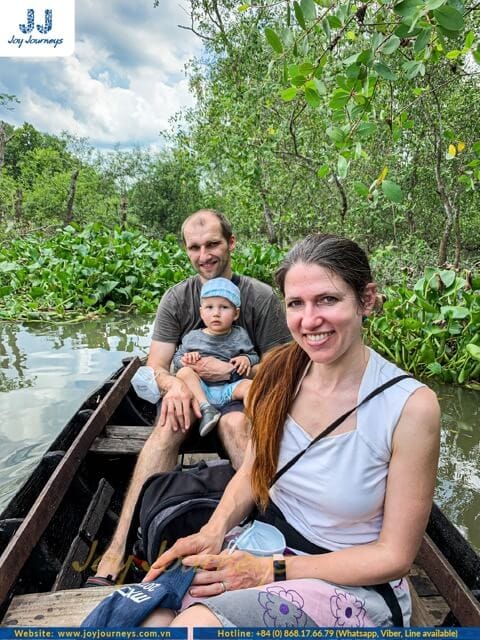
The ideal environment for taking part in these aquatic experiences is calm waters and sunny weather.
In addition to kayaking and boat tours, you can enjoy many other activities that tourists can enjoy in the Mekong Delta during the dry season.
You can explore the floating markets, where locals sell fruits, vegetables, and other goods from boats. You can also visit the numerous orchards and gardens in the area, where you can sample tropical fruits such as dragon fruit, mangoes, and papayas.
Other popular activities include cycling through the countryside, visiting local craft villages, and taking cooking classes to learn how to prepare traditional Vietnamese dishes. Overall, the Mekong Delta offers a variety of unique experiences that can be enjoyed during the dry season.
In the south, it is best to explore the vibrant city of Ho Chi Minh and relax on the beaches of Phu Quoc.
Though the weather is a bit hot and humid, it should still be a great time to enjoy the lively atmosphere of the city and the stunning beaches of the island.
Don’t forget about the cuisine either!
Vietnam’s regional food is accessible year-round and is incredibly delicious during the dry season.
Vietnam’s cuisine, which ranges from delectable street food to Michelin-starred restaurants, is a highlight of any visit to the country.
If you want to discover Vietnam’s breathtaking scenery, culture, and food, you can choose from a wide range of experiences during the country’s dry season.
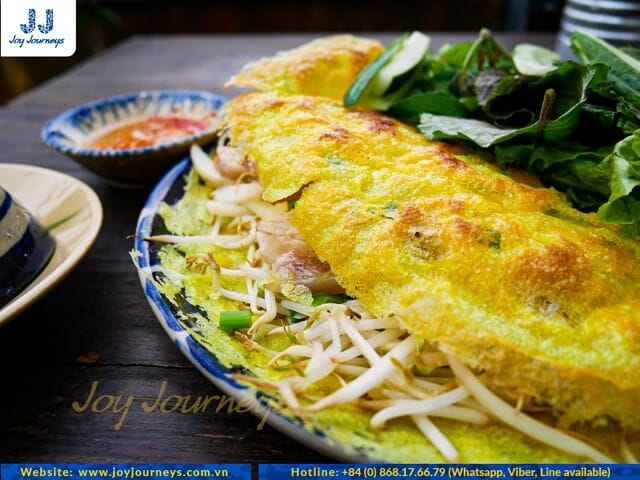
So, pack your bags and get ready for an adventure of a lifetime!
Visiting Vietnam is now much easier with eVisa.
Wet Season (May to October)
Vietnam’s wet season, which runs from May to October, may not be the most popular time to visit the country, but it’s a fantastic time to experience Vietnam in a different light.
As someone who has traveled in Vietnam during the wet season, I can tell you that it’s a great time for adventure seekers who are willing to embrace the rain and enjoy a unique travel experience.
During the wet season, the weather in Vietnam is characterized by heavy rainfall, high humidity, and occasional thunderstorms.
While this may not sound like the ideal weather for a vacation, it’s important to remember that the rain is what makes Vietnam’s stunning landscapes so lush and green.
In the north of Vietnam, the wet season brings cooler temperatures, with misty mountain views that are perfect for visiting the rural villages in the Northwest.
The terraced rice fields in Sapa become even more vibrant during this time, and the waterfalls in the region are at their most spectacular.
The capital city of Hanoi is also much quieter during this time, making it a great time to explore the city’s museums, temples, and street food scene.
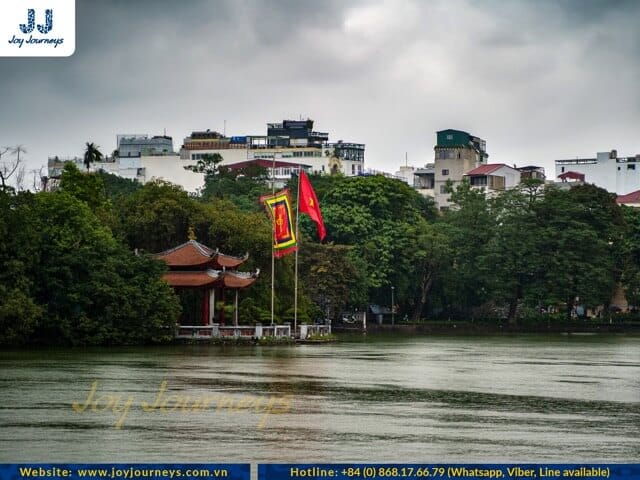
In central Vietnam, the wet season brings occasional floods and typhoons, but it’s also a great time to explore the region’s many natural wonders.
The caves in Phong Nha-Ke Bang National Park are at their most impressive during the wet season, and the Hue Citadel is also a great place to explore in the rain.
The beaches of central Vietnam are less crowded during this time, making it a great time to enjoy some quiet time by the sea.
Hurricanes and floods can be hazardous in Vietnam, particularly during the rainy season, which lasts from May to October.
These natural disasters can cause substantial damage to infrastructure, houses, and crops, as well as death.
Travelers should be aware of the risks and execute the necessary procedures to ensure their safety while on the trip.
Central Vietnam has the highest risk of floods and typhoons from September to December, while the northern region is affected from August to October. The southern part is generally less affected. The best time to visit to avoid these risks is from December to April.
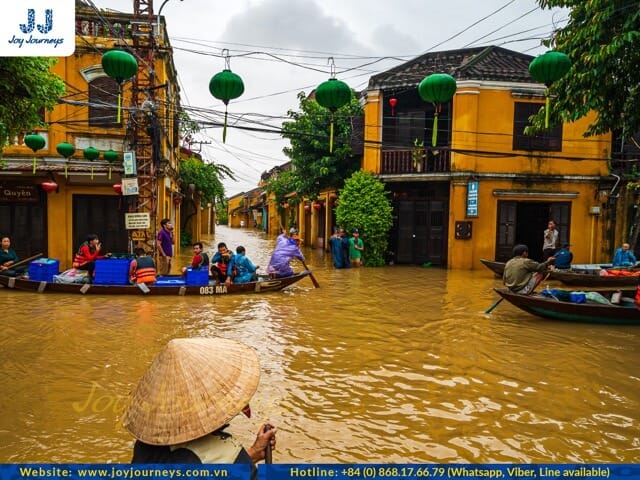
In the south of Vietnam, the wet season brings hot and humid weather, with frequent afternoon thunderstorms. Despite the rain, this is a great time to explore the vibrant city of Ho Chi Minh, with its bustling markets, museums, and street food stalls.
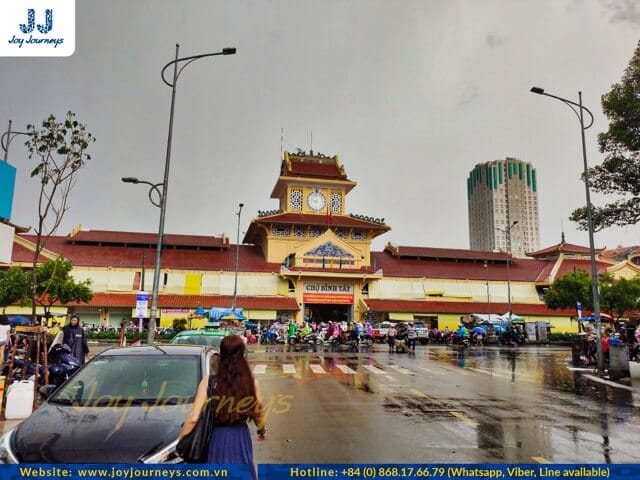
The Mekong Delta is also a great place to visit during the wet season, as the rainwater floods the area and creates a unique landscape that’s perfect for exploration.
Particularly, if you are planning to visit Saigon during the wet season, do note that the rainy season lasts from May to November. During this period, the city may see heavy rain and flooding in low-lying areas. Flooding is most likely in Districts 2, 4, 7, and Binh Thanh.
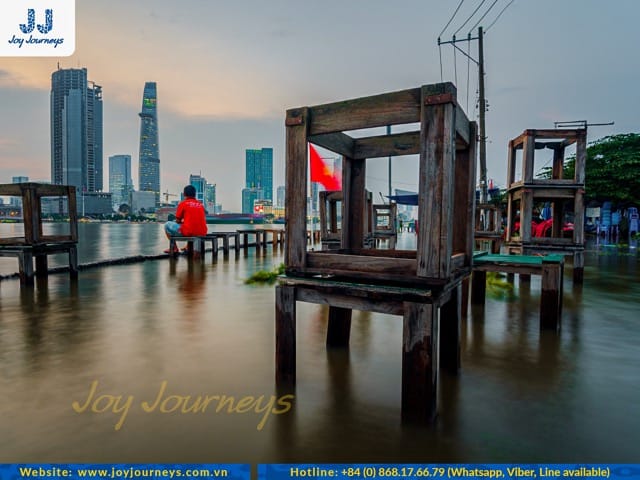
To avoid these risks, you should avoid walking or driving through flooded areas and exercise caution when crossing slippery streets or sidewalks. Check the weather forecast and plan appropriately, as typhoons and severe rain can cause flight delays or cancellations.
However, you may still enjoy a vacation to Saigon during the rainy season with some planning and prudence.
Overall, the wet season in Vietnam offers a unique travel experience for adventure seekers who are willing to embrace the rain and enjoy the country’s stunning landscapes in a different light.
From trekking in the north to exploring the Mekong Delta in the south, there’s plenty to see and do during this time. So, pack your raincoat, put on some waterproof shoes, and get ready for an adventure of a lifetime in Vietnam’s wet season!
What You Need to Prepare for Your Trips for Each Season
You can enjoy a safe and pleasurable journey to Vietnam during both the wet and dry seasons by planning ahead and packing appropriately.
Dry Season (November to April):
- Pack lightweight, breathable clothing for the warm weather, especially if you’re traveling to southern Vietnam, where it can get hot and humid.
- Bring sunscreen, sunglasses, and a hat to protect yourself from the intense sun.
- Consider bringing a light jacket or sweater for cooler evenings and mornings, especially if you’re traveling to northern Vietnam, where the temperatures can be cooler.
- Bring comfortable shoes for walking and exploring, as there will be plenty of opportunities for outdoor activities and sightseeing.
- Make sure to bring insect repellent, as mosquitoes and other insects can be present, especially in rural areas.
- Consider booking accommodations and activities in advance, as the dry season is the peak tourist season, and famous places can fill up quickly.
Research about Vietnam currency to have a enjoyable trip.
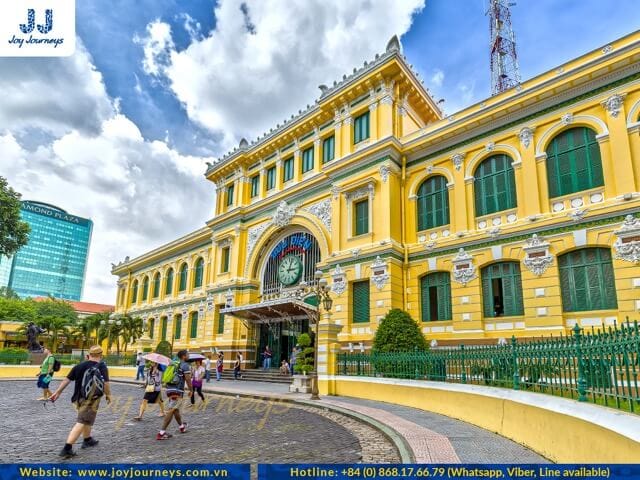
Wet Season (May to October):
- Pack waterproof clothing, including a rain jacket or poncho, as well as waterproof shoes or sandals.
- Consider packing quick-drying clothing and shoes, as the humidity can make it difficult for clothes and shoes to dry.
- Bring insect repellent, as mosquitoes and other insects are more prevalent during the wet season.
- Consider bringing a small umbrella, as it can be useful for both rain and sun protection.
- Be prepared for occasional flooding and transportation delays, especially if you’re traveling to central Vietnam, where typhoons and floods can be common.
- Book accommodations and activities that are flexible and can be changed or canceled in case of inclement weather.
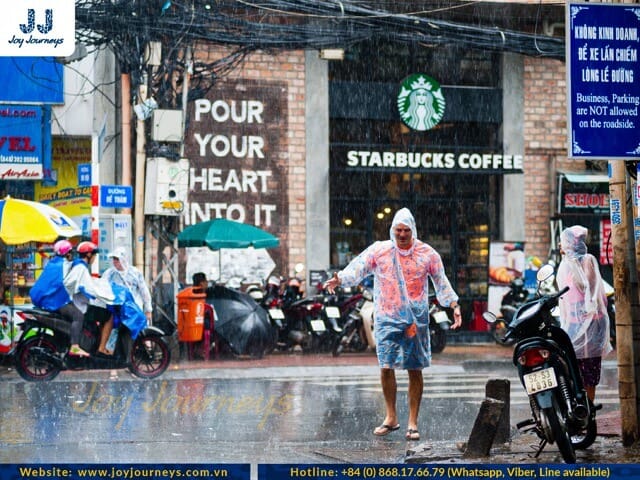
Conclusion
In conclusion, Vietnam is a beautiful and diverse country that can be enjoyed by tourists at any time of the year. However, the dry season (November to April) is generally considered the best time to visit, as the weather is cooler and drier, making it easier to explore the country’s many outdoor activities and attractions.
During the dry season, travelers can enjoy activities such as trekking, exploring historic sites, and relaxing on beaches. However, it’s vital to pack appropriate clothing and plan as this is also peak tourist season.
On the other hand, the wet season (May to October) can also be a great time to visit Vietnam, especially for those interested in unique experiences such as caving, cooking classes, and the chance to see the lush green landscapes that the rain brings. However, travelers should be prepared for occasional flooding and transportation delays.
Overall, tourists can go to Vietnam at any time of the year and have a wonderful experience. But for those seeking the ideal combination of weather and outdoor activities, the dry season is the best time to visit. So pack your bags, book your accommodations, and get ready to explore all that Vietnam has to offer!


Related Posts
Best Time To Visit Ho Chi Minh Book Street: A Complete Guide
Ho Chi Minh City’s literary heart beats strongest along a charming pedestrian street where books, culture, and Vietnamese cafe life converge. Understanding the best time to visit Ho Chi Minh Book Street can transform your experience from a simple browse to an unforgettable cultural immersion. This comprehensive guide reveals when to visit, what to expect, […]
Top 5 Best Homestay Can Tho: Explore Local Culture
Can Tho, the vibrant heart of the Mekong Delta, offers travelers an extraordinary opportunity to experience authentic Vietnamese culture through its charming homestays. For travelers seeking genuine connections with local families and immersive cultural experiences, choosing the best homestay Can Tho provides an unforgettable alternative to conventional hotels. This comprehensive guide showcases the finest homestay […]
Can Tho Bike Tours: Explore the Mekong Delta On Two Wheels
Can Tho, the vibrant heart of the Mekong Delta, offers travelers an extraordinary opportunity to explore Vietnam’s “rice bowl” region at a leisurely pace through can tho bike tours. Whether you’re seeking cultural immersion, natural beauty, or simply an eco-friendly way to explore, cycling through Can Tho’s landscapes offers an unforgettable perspective on Mekong Delta […]